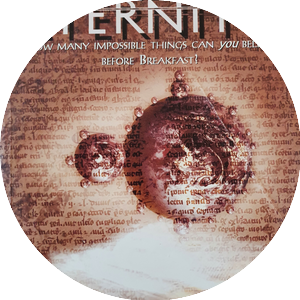Motivation
I can’t quite remember how I came into contact with Sean Aita. But I think that it was all because of a script: before entering it in the Manchester Student Playwriting Competition, I sent a copy of A Night on the Tiles to the Leicester Haymarket theatre to see if they would produce it. They wouldn’t, but the person who had read it ended up mentioning it to Sean, who was an associate director at the Royal Theatre Northampton and looked after their Theatre in Education (TiE) shows. The reader thought the play might have a more comfortable home in a TiE house, and Sean agreed: he got in touch, told me he liked the play and asked if I would like to come to Northampton to talk to him.
By that point, A Night on the Tiles had won the competition and was off the table. We talked a little about the kinds of things I liked to write, and the kinds of things that a TiE department liked to produce. Sean asked if I had any other scripts that might be suitable, and I told him about my calling card script Wolfsong … which again I made the mistake of introducing as based on an Angela Carter story, and so immediately got him thinking about rights issues. But he read the script, enjoyed it and quite rightly pointed out that it wasn’t really TiE and wouldn’t comfortably fit in his schedule.
But if I came up with something else that would, he would be happy to read it.
At that point, my working relationship with IRDP (who produced my first two plays) had come – amicably – to an end. I was regularly sending plays to theatres from London to Edinburgh, and I got a lot of good feedback about my ability and several requests to send in the next thing that I wrote. But I didn’t get asked to meet anybody, and I didn’t get even the slightest hint that there might be a job just around the corner.
There was no way that the next thing I wrote wouldn’t be suitable for Sean.
Inspiration
My mother has enjoyed a long career as a librarian in a number of Secondary schools, and having talked to Sean about exactly what bit of the National Curriculum his TiE plays had to cover, I asked my mother to get me a copy of it. I’d already decided that my best bet would be to focus on history – research is one of my strengths as a writer – and the choices that I had back then were Romans, World War II or the English Civil War. With the local (to Northampton) connections to the Civil War, I decided that this was my period and started researching.
The play was also influenced by the Three Lives of Lucie Cabrol – a fantastic mix of physical theatre and fourth-wall breaking that very much influenced by theatrical style – and the writings of Bertolt Brecht, who I had studied and fallen in love with at University.
Getting the Story
At the time I was writing A Northamptonshire Tale, I was in my final year of a Drama degree at Manchester University. One of my course units was a writing course that involved writing a play over the course of a term, reading it out piecemeal to the class week by week for their feedback. I started with a synopsis, so by the end of the first week I had my story pretty much mapped out.
I knew that it was going to be centred around the Battle of Naseby, to make it more involving for a Northampton audience. I’d also decided that it would be a play within a play, having read something of the troubles actors were faced with during and after the Civil War and wanted a way to bring them in without making it a play about actors. Plus it gave me an excuse for breaking the fourth wall and also the theatricality of the final piece. It was then the ending that came to me first – rare for me – and so I had the relative luxury of simply getting the characters from A to Z.
Outside Help
The writing course was run by Michael Holt, a lecturer at Manchester University who also has a long career in stage design. Whilst we students were reluctant to offer much in the way of feedback on our colleagues writing, Michael was not so shy. He was – perhaps mindful that the year before a different tutor had reduced students to tears with his criticisms of their work – always enthusiastic and positive, and I don’t think I was the only person on the course who started working harder just to try and make him smile when the scene was read out.
He made some suggestions for comic business that made the first act stronger and the break into the second much more defined, but the best thing he gave me was confidence. I had always intended to leave the play with an open ending – half-thinking that it would provide a good jumping off point for teachers planning the follow-up work, but also influenced by Life’s a Gatecrash, which ended powerfully before the drama was quite resolved. But I wasn’t sure that I had done the right thing until I finished reading out the final scene of the play and Michael loudly and proudly called me a bastard for leaving it just when he wanted to know more.
The Pitch
Knowing that I wanted to send the play to Sean Aita, I was quite shameless about using my connection with him to help me through my course, and my course to build my relationship with Sean. The synopsis I wrote for the play was sent immediately to Sean to ask if it was the kind of thing he might be interested in, and his response saying he’d be happy to read the final script went straight into my coursework folder.
The synopsis was written in character, a letter from a Justice of the Peace who had watched the play performed by my fictional troupe of actors. It was written that way because I never had a lot of confidence in my ability to write a compelling synopsis, and the story of Robert Holmes pitching The Time Warrior with a field report from an alien soldier was in my mind. I shudder now when I think of how it must have appeared to a professional theatre: it feels gimmicky now, unprofessional even, and I didn’t appreciate then how much of a risk it was. But that said, it worked: Sean was glad enough to read the script when it was finished.
Once he had it, I also succumbed to the temptation to do the other thing you should never do: as the term was coming to an end and my final grade for the writing course being decided, I thought I had a good enough excuse to write to Sean and ask him if he had read the script and what he thought of it. I pretended I was doing it because my grade was dependent on Sean’s opinion, as if Michael wasn’t already aware of Sean’s interest in the script and wouldn’t know if he thought it was any good without Sean telling him it was. In truth it was just impatience to find out if Sean thought it was good enough, and if my writing could get produced without IRDP.
This was the second thing I did that could have backfired, but as it was Sean sent me a glowing reply saying how much he liked the play and that – schedules, budgets and other commitments being amenable – he had every intention of producing it.
I passed the writing course with flying colours.
Editorial
I stayed in touch with Sean Aita, but – glowing letter aside – he wasn’t ready to call the script complete. He asked for a number of rewrites, including asking me to increase the amount of humour in the play, probably more mindful than me of the final production’s intended audience. I approached the rewrites in the wrong way, looking to preserve as much of the original text as possible, and so very hard to add in anything new. The odd one-liner was crow-barred in to the first act, but the second act was left almost completely alone: with hindsight, I should have taken the opportunity to look again at the story as a whole, and see what could be cut out to make more room for some humour.
Again, I was lucky: I had finished my drama degree (having had to write a shorter piece called Curia for the final presentation section of the course as the department apparently didn’t expect anyone on the writing course to write a full length play) and was on my way to returning to Manchester for a post-graduate degree in theatre writing, when Sean wrote back and said that he was happy with the script. His last editorial request was to change the title from the Right and Truthful History of the Labourer of Northampton (The Labourer) to the easier to say in one breath A Northamptonshire Tale. That done, the next contact I had was from the Royal Theatre’s finance team, arranging payment for the script.
What Happened Next?
The payment was an advance for a royalty on a set number of performances of the play, both in Northampton and on a tour of the local area. This was in 1999, and Sean warned me that the production wouldn’t be that year because they had just done a tour with a play set in the same period. Time kept ticking on, but it was eventually suggested the A Northamptonshire Tale would start touring in 2000. I waited dutifully to hear from Sean confirming that things were ready to get started, but eventually what I heard instead was that Sean had moved on from the Royal Theatre.
I didn’t receive any official notification – nor would I expect any – but what I expect happened was that once Sean left, my play was seen very much as his baby. Whilst they’d paid me for my work on it, it would have cost them more to mount a full production of the script than it would to write it off. Sean’s replacement would have had their own things that they were enthusiastic about, and all their time and effort would have gone into making those happen, not a script that they had inherited.
I remained philosophical about this – I had, after all, been paid: this could have happened at any point before Sean bought the play, and I would have had nothing to show for it except a play that didn’t really make sense in any other theatre. But on another level, it came at just the wrong time for my theatre career: I had lost my connection to IRDP, the Royal Exchange writers’ group I was a member of had closed without leaving me any closer to getting a play on there, and a number of people I had been sending plays to and getting positive feedback from had also just moved on. Even the radio producer I was in contact with at the BBC changed jobs, and no longer had an interest in drama.
I know now that this is just part and parcel of being a writer. As a writer, you are just a freelancer, and it is in the nature of any freelancer’s career that contacts and opportunities will disappear over time. You just have to focus yourself on finding enough new ones to replace them: you will never get a job that lasts for the rest of your career, and you will never be quite sure where the next one will come from. But at that point, it seemed like it was the industry telling me that I wasn’t good enough to work in theatre. I have sometimes suggested that I don’t write for theatre any more because Heritage got accepted and I spent too much time chasing a second Dr Who book. In truth, though, I was ready to leave theatre behind because I was looking for a writing career that was easier, more comfortable, safer.
It took a long time for me to embrace the fact that unicorns don’t exist.


